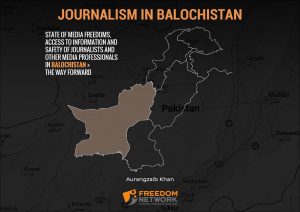Press Release
GILGIT, 26 June 2025: The mountainous northern region of Pakistan has a rich history of journalism but currently it is facing significant challenges that hinder free expression and safety of journalists, a new research report by media watchdog Freedom Network launched here on Thursday revealed.
The report, titled “Journalism in Gilgit Baltistan: State of Media Freedoms, Access to Information and Safety of Journalists,” delved into evolution of media in Gilgit Baltistan, the constraints on media freedoms, threats to free speech, the precarious service structure for journalists, gender disparities with the profession and the overall safety of journalists in the region.
“Gilgit Baltistan has long been ignored in media development and the result is that despite its rich journalism history the region’s media deserves much more attention than it is receiving today,” Freedom Network Executive Director Iqbal Khattak said during the report launch in Gilgit city.
Co-authored by media development professional Adnan Rehmat and Iqbal Khattak, the report was launched in collaboration with Gilgit Press Club, Gilgit Union of Journalists and Ibex Media Network.
The report was launched in Gilgit city on Thursday (26 June 2025) in collaboration with Gilgit Press Club, Gilgit Union of Journalists, GB Union of Journalists and Ibex Media Network.
GB Assembly Speaker Nazi Ahmed Advocate was the chief guest while GB Government Advisor on Information Emaan Shah was keynote speaker. GB Minister for Information Technology Ms Sorya Zaman and GB Assembly Standing Committee on Information chairman Javed Ali Manwa were also present besides civil society and Gilgit Press Club, Gilgit Baltistan Union of Journalists and Gilgit Union of Journalists’ representatives.
The report’s findings stressed that national and international media outlets “have correspondents in GB but offer limited coverage, often focusing on tourism rather than addressing deep-rooted socio-political and economic issues.”
“The presence of national media is limited, and significant gaps in coverage persist. Broadcast media, particularly FM radio, lacks diversity and offer limited current affairs or news programming. Print media, with barely sustainable, is heavily dependent on government advertising revenue, which compromises editorial independence.
“Moreover, many newspapers are ‘dummy’ publications existing solely for advertisement purposes,” the report’s findings listed reasons for significant challenges free expression is facing in Gilgit Baltistan.
Digital media, the research report noted, emerged as significant platform for current affairs in Gilgit Baltistan but “faces substantial obstacles. Limited internet access and financial constraints hinder its growth.”
Geographic isolation, a restrictive political environment, suffocating socio-economic conditions, inadequate infrastructure and increasingly coercive state oversight constrained media freedoms in Gilgit Baltistan, the report findings read.
“Local voices and concerns remain underrepresented and national and international media offer superficial coverage, neglecting critical regional issues,” one of key findings of the report underlined.
The report listed businesses, politicians, bureaucrats and state-owned enterprises and actors as potential threat actors media and its practitioners were facing in Gilgit Baltistan.
Ethnic and sectarian pressures brought extra risks journalists face, the report said, adding that journalists were attacked on basis of ethnicity or religious background. “Reporting on sensitive issues like security issues invites additional scrutiny and potential retaliation from state agencies,” the Freedom Network report added.
Poor service structure remained key concern of journalists in the region, it underscored. “Many journalists are unpaid or receive minimal compensation, leading to financial insecurity and deterring new talent from entering the profession.”
The report expressed concerns at gender disparities in the profession further impeding media freedoms in Gilgit Baltistan. “Women constitute a miniscule fraction of journalists, facing societal pressures, gender-based violence and financial challenges that discourage participation in journalism,” it said.
Click below link to download the full PDF version of the report
https://www.fnpk.org/wp-content/uploads/2025/07/Journalism-In-Gilgit-Baltistan-1.pdf


